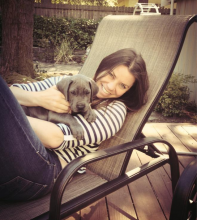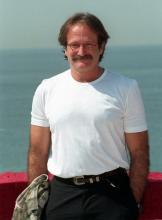Suicide

THE REMAINING LISBON sister are sprawled in their bedroom when the priest knocks on their door.
“Hello girls, I thought we could talk. Do you feel like talking?”
Their returning stares are vacant and unknowable, and the priest wears only the pretense of concern. Both parties maintain their false decorum, neither fully able to acknowledge their shared grief: the suicide of Cecilia, the youngest Lisbon sister, only 13 years old.

The Von Erichs believed in the salvific power of both faith and wrestling.

PASTOR ALEXIS (narrated by Stephanie Hsu) is a recent divinity school graduate who has been hand-selected by Pastor William Hoyt (voiced by Bill Irwin) to succeed him at Trinity Grace Church in Ohio. Alexis has been working alongside Will, learning the rhythms and rigors of pastoring a small-town church. She’s young, radical, and fearless. These qualities — the very reasons Will chose her — are exactly what make a significant and influential portion of the congregation certain she’s the wrong choice. Then Will dies by suicide. Alexis is thrust into the role of lead pastor far sooner than she expected, and in apocalyptic conditions. All this is merely the first episode of Six Sermons, a 12-episode fiction podcast written by Asa Merritt (a journalist and author of the 2015 play True Believer about the Arab Spring).
Six Sermons is the story of how Alexis navigates this intense crisis: How will the cause of Will’s death impact the congregation? What should the memorial service entail? How is Alexis caring for her own mental health in the wake of her friend and mentor’s death?
Alexis, in particular, experiences God’s absence acutely. Six Sermons powerfully illustrates the humanity of pastors; both Will and Alexis are raw, vulnerable, and flawed. Early in their mentoring relationship, Will tells Alexis, “You don’t really know God until you meet him at night.” This is a story of meeting God at night.

If you or a loved one have been impacted by suicide or self-harm, there is nothing to be ashamed of. Scripture teaches us that when one person suffers, we all suffer. Yet if you are in a place of active suicidal ideation, or having self-harming thoughts, it can feel like you have been completely swallowed by the dark; it’s a lonely and terrifying place. But here is the truth: You are wanted on this earth.

For those of us who have a relative, friend, or church member suffering from mental illness, I pray we turn away from the dangerous belief that mental illness is something that can be prayed away. Keep praying, but stop telling us to pray in an effort to rid ourselves of mental illness because it gives more power to our shame. In addition to your prayers, take action that helps.

“We know that the more places where a young trans person can show up in the world as their whole self, the better,” said Hartke. “So why not make church one of those places? Can we imagine a world where the church is the most supportive place in a trans person's life, rather than the place they fear the most?”

SUICIDE IS A SIN. As a Catholic, that’s what I was taught. Life is a gift from God; only God can take it away. Suicide chooses despair over God.
But I’ve never understood suicide to be an individual sin. It’s a communal one—based in a profound failure of love.
This past spring, two young men committed suicide while in the custody of the Department of Homeland Security. Beyond individual and communal sin is structural sin—when lovelessness is made into policy and enacted with cruelty. Note all the places where love failed.
In May, Marco Antonio Muñoz, a 39-year-old Honduran refugee, died in a south Texas jail cell of apparent suicide a few days after being forcibly separated from his wife and 3-year-old son at the U.S. border. And I mean “forcibly.”
When Border Patrol agents told Muñoz that the family would be separated, he “lost it,” according to The Washington Post. “‘The guy lost his s—,’ an agent said. ‘They had to use physical force to take the child out of his hands.’”
Muñoz was transferred to a county jail and placed in a padded isolation cell. Guards checked on him every 30 minutes. Reportedly, every time the guards passed during the night, they noted him praying in the corner of his cell. By morning, Marco Antonio Muñoz was dead.

Tuxedos on Ice
Need a cold distraction from summer heat? Love penguins? Want to be inspired by rugged scenery and a field biologist’s enthusiasm for his work, despite harsh conditions, endless counting, and climate change? The documentary film The Penguin Counters is now out on iTunes and DVD. First Run Features
Find What’s Missing
In the picture book Who Counts? 100 Sheep, 10 Coins, and 2 Sons, biblical scholar Amy-Jill Levine and children’s book author Rabbi Sandy Eisenberg Sasso imaginatively retell three of Jesus’ parables. Suitable for kids 4 to 8. Includes afterword for parents and teachers. Illustrated by Margaux Meganck. Westminster John Knox
An American Story
Amir Hussain’s Muslims and the Making of America is a compact overview of how Muslims have been an intrinsic part of American society, politics, and culture since the colonial era. Released last fall, but timelier than ever as anti-Muslim rhetoric and actions grow. Baylor University Press
Not Alone
In Grieving a Suicide: A Loved One’s Search for Comfort, Answers, and Hope , Albert Y. Hsu explores the hard emotional and spiritual questions survivors face. First published in 2002, this newly revised and expanded version includes updated resources and a discussion guide for suicide-survivor groups. IVP Books

On May 17, Chelsea Manning, who was in a U.S. military prison for seven years on charges of whistleblowing, was released, reports ABC News. On Jan. 17, President Obama commuted the bulk of Manning’s 35-year prison sentence, enabling her to be released this year. Had President Obama not done so, Manning’s year of release would have remained 2045.

The backlash to gospel singer Kim Burrell’s homophobic rant was swift: canceled national television appearances and the termination of her local public radio show.
But to those of us in religious communities, it’s important to note that, even as the controversy over Burrell’s statement recedes from the national spotlight, the issue of what goes on in the vast majority of American churches remains a festering wound.

A new short documentary, "What Happens When an Evangelical Church Welcomes LGBTQ Members," features Rev. Adam Phillips, a pastor in Portland, Ore., whose church was kicked out of the Evangelical Covenant Church denomination in 2015 when Phillips revealed his full acceptance and support of the LGBTQ community.
"I hadn't really grown up in a faith community, and the Covenant Church was my faith family," he says. "I poured myself into it, and for a long season they poured themselves into me. I was one of the young emerging leaders...to be the future leaders of the church."

Recently, a friend emailed me that their twenty-three-year-old son had attempted suicide. The young man had been found fairly quickly, but due to the nature of his attempt and his severe depression, he is now in a hospital's psychiatric ward. My friend asked, “How did it get so bad and I didn't know?” She is trying to process guilt and anxiety about what might have happened. Her son is getting the help he needs, but it’s a long journey back to health and wholeness for the entire family.

Belgium is embroiled in a religious freedom controversy after the new head of the country’s Roman Catholic Church demanded that faith-run hospitals and nursing homes have the right to refuse euthanasia to patients.
A 2002 law decriminalized euthanasia for terminally ill adults and it has the support of a large majority of public opinion and politicians. But opposition in this historically Catholic country has grown as lawmakers extended the practice to including terminally ill children and people with severe psychological problems.

Chaplains who are part of the Army’s first line of defense against suicide say they need more training in how to prevent soldiers from killing themselves, according to a Rand Corp. survey published online April 7.
Nearly all the chaplains and chaplain assistants surveyed said they have dealt with suicidal soldiers, and most said they encourage troubled soldiers to get help. Because of confidentiality, roughly half said they would be reluctant to alert someone in the chain of command about the soldier, and roughly a third said they would not call a crisis hotline for the GI.
In addition, the study found that chaplains and chaplain assistants hold some of the same negative views about therapy that often discourage soldiers from seeing a behavioral health specialist. Most in the survey agreed that service members who seek help for suicidal thoughts would be seen differently by their peers. About half said they would be embarrassed.
Researchers said they believe this may be why chaplains are reluctant to intervene when a soldier comes to them with signs of suicidal thinking.

Death never makes for easy conversation. But the choice of a 29-year-old Brittany Maynard to take her own life over the weekend has a lot of people talking. There are the sad and belligerent comments in the name of Christianity, as well as those from supporters of her decision and still others who seek to be empathetic but strongly disagree.
Nearly five years ago, I was laying in an ICU, on oxygen, catheterized, wearing a diaper, and on a constant flow of the most potent narcotics the hospital had available. I could not eat, drink, or even hold an ice cube in my mouth and was unable to get out of bed under my own power. Much of my family had gathered in the room to hear the doctor pronounce that there was nothing more they could do.
My situation was not the same as Brittany’s or any others’ with terminal cancer, but this experience left me with a heightened awareness of some areas where Christians need to do better when faced with death and pain. It’s beyond the scope of this post to lay out all of the theological and moral implications involved, let alone all of the political and legal implications, but here are four areas for thought.

When I began a Masters of Divinity program at Wesley Theological Seminary, I was convinced that my generalized anxiety would be a wrinkle I’d iron out as I became more competent in preaching and pastoral care. What I failed to recognize was that my aptitude for ministry in itself was not the issue. I already felt called to hospital chaplaincy and had had experience working with the sick and dying as a nursing assistant. However, despite all the practical knowledge I’ve continued to gain at Wesley, anxiety has remained a debilitating problem.
When my anxiety was at its worst this past spring, I often asked myself, what business do I have pursuing ordained ministry? How can I serve others if I can’t take care of myself? Last week, regarding the suicide of Robin Williams, I heard frequently: “How can someone so funny do that?” The best answer I’ve found is that even when we are in great pain and anguish, feeling isolated from others, we don’t stop doing what we do best. Even in times of depression, and drug and alcohol abuse, Williams never ceased to do what he did best — make people laugh when they most needed to. Likewise, despite my anxiety, no matter how I attempt to close out the world, I still feel called to the ministry of chaplaincy, to bring healing to others through my presence.

It feels awkward and even a bit inappropriate to be talking about ‘celebrity news’ when so much is going on around the world: Iraq, refugees in Syria, children stranded at borders, Michael Brown’s death and Ferguson, Ebola, Ukraine, and the list tragically goes on.
But then again, it feels appropriate because it’s another reminder of the fragility of our humanity.
As has saturated the news, Robin Williams passed away this week. His life ended way too short at the young age of 63 – apparently because of suicide. While this was news to me, Robin had been struggling with intense depression – especially as of late — and was recently diagnosed with Parkinson's Disease.
To be honest, I don’t get caught up too much on celebrity happenings mainly because there’s not much genuine connection. I don’t really know them personally. Make sense? Robin Williams’ death – on the other hand – just felt like a painful punch in the gut. Perhaps, it’s because Mork and Mindy (Nano Nano) was the first TV show I watched (along with Buck Rodgers) after immigrating to the United States. I deeply resonated with Mork – this ‘alien’ or ‘foreigner’ from another land trying to fit in. Perhaps, it’s because so many of the characters he played in countless movies influenced me on some level as it did so many others.

Yesterday morning I was prepared to write about being a sacred place where others could come for healing, encouragement, and restoration. I had no idea Robin Williams committed suicide yesterday. I didn't hear the news because all evening I was sitting with a friend who is going through one of the most difficult times in her life. I also rushed out the door this morning with two friends on my heart who were also going through a great deal of suffering. It was late morning before I found out Robin Williams passed away. Robin Williams, the great comedian? The one who warmed my heart in Patch Adams. The man who challenged me, through Patch Adams, not to just be a professional, but a professional who cared for people.
I've read a lot of posts on Facebook about how we (those still living) never know what a person is going through on the inside. I've read that a person can be smiling on the outside, but hurting on the inside. While this is certainly true for some, I find many who are hurting tell us they are hurting. In their efforts to reach out, we often shut the door on them. Sure, the first time or two we listen and tell them we are going to pray for them, but then they become "needy." I don't know how many times Christians have warned me to stay away from a person because they are "needy" or "too clingy." I remember one time thinking, "Why wouldn't they be needy?" I thought this because we both (the commenter and I) knew the horrible situation our sister was in. I couldn't imagine the pain she was going through. However, this person believed our sister in Christ was being too "needy."
While I believe that we should never replace God by trying to be the Savior, I do believe we should be a place where those who are hurting can come.

That a “universally beloved” entertainer such as Robin Williams could commit suicide “speaks to the power of psychiatric illness,” mental health experts say.
Williams, who died Monday at age 63, had some of the risk factors for suicide: He was known to have bipolar disorder, depression, and drug abuse problems, said Julie Cerel, a psychologist and board chair of the American Association of Suicidology.
People who are severely depressed can’t see past their failures, even if they’ve been as successful as Williams.
“With depression, people just forget,” said Cerel, who is also an associate professor at the University of Kentucky. “They get so consumed by the depression and by the feelings of not being worthy that they forget all the wonderful things in their lives.”
They feel like a burden on their family and that the world would be better off without them.
“Having depression and being in a suicidal state twists reality. It doesn’t matter if someone has a wife or is well-loved,” Cerel said.
Williams was certainly beloved, as shown by the outpouring of grief and sympathy on social media outlets Tuesday night.

I log onto Facebook every day. It tells me that it’s OK to talk about a bad date, to engage in family arguments for all to see, or even to display how envied one believes him/herself to be via self-portraits from a bathroom mirror.
Let’s be honest. Social media has caused an eruption of platforms in which people across the globe feel comfortable laying it all out there. There is a certain acceptance of divulging personal information that my parents’ generation wouldn’t dare ever bring up in a private forum, much less a public one. This phenomenon raises the question: If it’s OK to talk about almost anything these days, why are important topics still being held captive in the land of anonymity?
Abortion. Incest. Rape. Bankruptcy. Depression. Mental illness.
And then there’s suicide.
So why write about it now? Because I fell into the trap of ignoring an important topic simply because it had never hit close to home. And then came the phone call.